| Voice/Instrument: | Pianoforte |
Biography
Gilels was born in Odessa, Russian Empire (now part of Ukraine) to a Jewish family with no direct musical background that nevertheless owned a piano. He began studying the piano at the age of five under Yakov Tkach, who was a student of the French pianists Raoul Pugno and Alexander Villoing Thus, through Tkach, Gilels had a pedagogical genealogy stretching back to Frédéric Chopin, via Pugno, and to Muzio Clementi, via Villoing. Tkach was a stern disciplinarian who emphasized scales and studies. Gilels later credited this strict training for establishing the foundation of his technique.
Gilels made his public debut at the age of 12 in June 1929 with a well-received program of Beethoven, Scarlatti, Chopin, and Schumann. In 1930, Gilels entered the Odessa Conservatory where he was coached by Berta Reingbald, whom Gilels credited as a formative influence. Also in Odessa Conservatory Gilels studied special harmony and polyphony with professor Mykola Vilinsky.
After graduating from the Odessa Conservatory in 1935, he moved to Moscow where he studied under Heinrich Neuhaus until 1937. Neuhaus was a student of Aleksander Michałowski, who had studied with Carl Mikuli, Chopin's student, assistant and editor.
A year later he was awarded first prize at the 1938 Ysaÿe International Festival in Brussels by a distinguished jury whose members included Arthur Rubinstein, Samuil Feinberg, Emil von Sauer, Ignaz Friedman, Walter Gieseking, Robert Casadesus, and Arthur Bliss. His winning performances were of both volumes of the Brahms Paganini Variations, and the Liszt-Busoni Fantasie on Two Motives from Mozart's "Marriage of Figaro". The other competitors included Moura Lympany in second place, and Arturo Benedetti Michelangeli in seventh place.
Following his triumph at Brussels, a scheduled American debut at the 1939 New York World's Fair was aborted because of the outbreak of the Second World War. During the War, Gilels entertained Soviet troops with morale-boosting open-air recitals on the frontline, of which film archive footage exists.[9] In 1945, he formed a chamber music trio with the violinist Leonid Kogan (his brother-in-law) and the cellist Mstislav Rostropovich. Gilels was awarded the Stalin Prize in 1946.
Gilels had a stable and happy family life, marrying Fariset (Lala) Hutsistova, a graduate of Moscow Conservatoire, in 1947. He lived with her all his life; they had a daughter Elena, an excellent pianist who graduated from Flier’s class of Moscow Conservatoire. She played in an ensemble with her father. Among Mozart’s double Es-dur concerto, Schubert’s f-moll Fantasy played with Elena and recorded (conductors R. Barshai and Karl Böhm) were included into Gilels’s masterpieces.
After the war, he toured the Soviet Bloc countries of Eastern Europe as a soloist. He also gave two-piano recitals with Yakov Flier, as well as concerts with his violinist sister, Elizaveta.
Gilels was one of the first Soviet artists, along with David Oistrakh, allowed to travel and concertize in the West. His delayed American debut in 1955 playing Tchaikovsky's Piano Concerto No. 1 in Philadelphia with Eugene Ormandy was a great success. His British debut in 1959 met with similar acclaim.
In 1952, he became a professor at the Moscow Conservatory, where his students included Valery Afanassiev, Marina Goglidze-Mdivani and Felix Gottlieb. As chair of the jury of the International Tchaikovsky Competition at the sensational inaugural event in 1958, he awarded first prize to Van Cliburn. He presided over the competition for many years.
Gilels made his Salzburg Festival debut in 1969 with a piano recital of Weber, Prokofiev and Beethoven at the Mozarteum, followed by a performance of Beethoven's Third Piano Concerto with George Szell and the Vienna Philharmonic Orchestra. Although paraded the world over as a Soviet loyalist, Gilels would occasionally confide his torments under the system to sympathetic fellow-artists.
In 1981, he suffered a heart attack after a recital at the Concertgebouw in Amsterdam,[14] and suffered declining health thereafter. He died unexpectedly during a medical checkup in Moscow on 14 October 1985, only a few days before his 69th birthday. Sviatoslav Richter, who knew Gilels well and was a fellow-student in the class of Heinrich Neuhaus at the Moscow Conservatory, believed that Gilels was killed accidentally when an incompetent doctor at the Kremlin hospital inappropriately gave him an injection of a drug during a routine checkup.[15] However, Danish composer and writer Karl Aage Rasmussen, in his biography of Richter, denies this possibility and contends that it was just a false rumour.


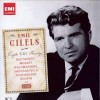
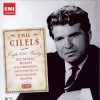
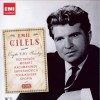

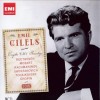
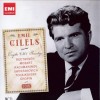
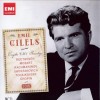
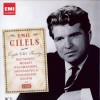
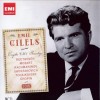
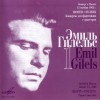
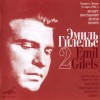
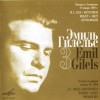
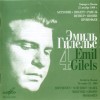
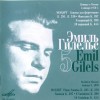
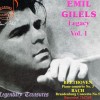
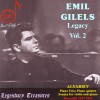
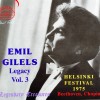
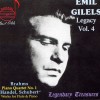
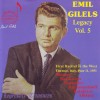
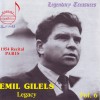
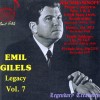
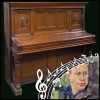
![Piano trios (Gilels, Kogan, Rostropovich) [5 CD]](http://static.classicalm.com/repository/collection-cover/small/219-img1316559969860933.jpg)
![Russian legends - Emil Gilels [16 CD]](http://static.classicalm.com/repository/collection-cover/small/261-img1318115683212190.jpg)
![Steinway Legends - Emil Gilels [2 CD]](http://static.classicalm.com/repository/collection-cover/small/235-img1316856590105306.jpg)
![Russian legends - Daniel Shafran [7 CD]](http://static.classicalm.com/repository/collection-cover/small/277-img1319146356180506.jpg)